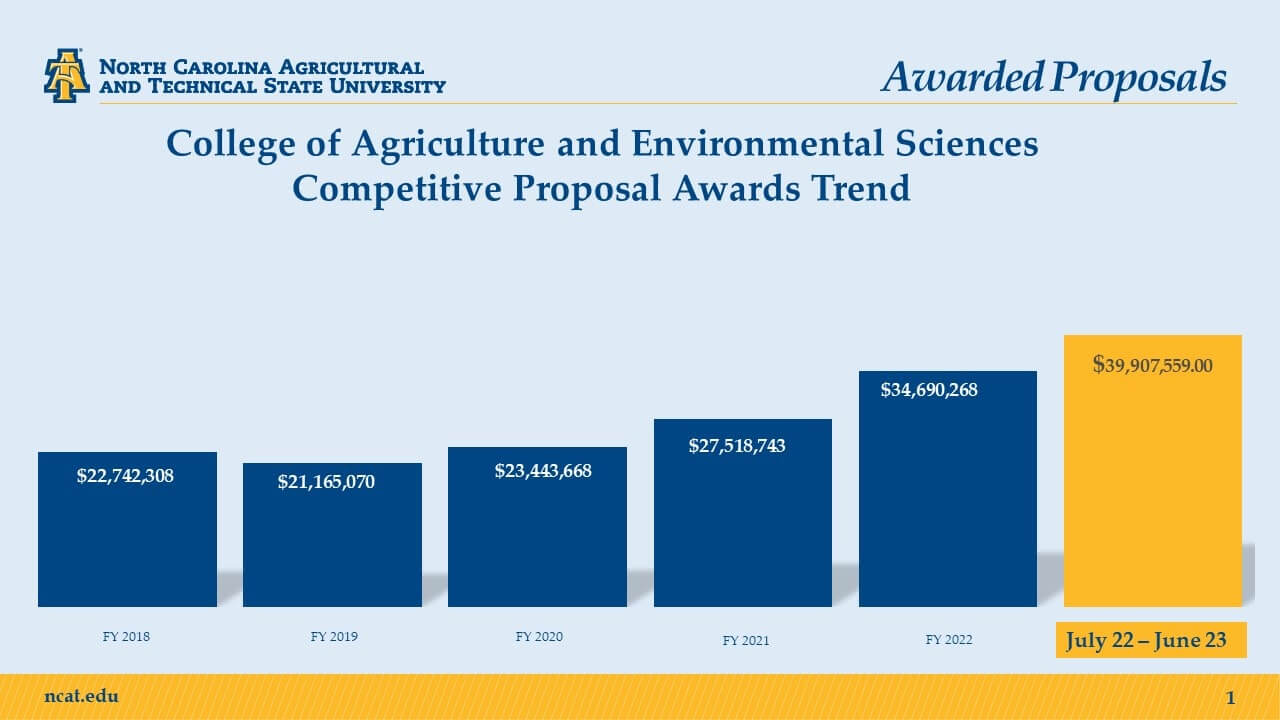CAES Research Portfolio Sets Record, Reaches Nearly $40M
CAES Research Portfolio Sets Record, Reaches Nearly $40M North Carolina A&T


EAST GREENSBORO, N.C. (Sept. 8, 2023) – Research funding in the College of Agriculture and Environmental Sciences (CAES) at North Carolina Agricultural and Technical State University reached an unprecedented $39.5 million this year, buoyed by major projects funded by the U.S. Department of Agriculture and the American Heart Association.
This year’s gain, an increase of more than $5 million from 2021-22, accounts for nearly one third of the university’s overall $147 million research portfolio. This is the fourth year research funding has climbed in the college, said Dean Mohamed Ahmedna.
The college is moving into digital, or “precision,” techniques, an emerging area that will play a pivotal role in the future of U.S. agriculture,” Ahmedna said. “This is one of our research priorities and will be a boost to our state’s $103 billion economic enterprise.”
Key Projects
- An $18.1 million U.S. Department of Agriculture grant to support a “NEXTGEN” program to increase participation of underrepresented minority students in food, agriculture, natural resources, and human sciences disciplines;
- Participating in two major projects to reduce greenhouse gases and improve climate-resilient agriculture production as part of the U.S. Department of Agriculture’s $2.8 billion Partnerships for Climate-Smart Commodities program;
- A $2.3 million grant, with the University of North Carolina at Chapel Hill, from the American Heart Association to improve maternal health outcomes among women who are more likely to experience pregnancy complications because of poor heart health.
The upward competitive grant funding trend allows our agricultural research activity to support a new generation of empowered small farmers contributing to thriving rural communities. For instance, we envision a future of climate-resilient agriculture in rural North Carolina,” said Gregory Goins, Ph.D., CAES associate dean for research.
In addition, the college is expanding its researching and testing of “precision agriculture” techniques, a term which refers to the application of modern information technologies to provide, process, and analyze data to operators to inform their practice.
Precision dairy technology, for example, such as the University Dairy’s new Automated Milking System, assists producers in adjusting to the needs of individual animals and conditions, saving unnecessary expense and resources, and “personalizing” animal care. Each cow is monitored and becomes uniquely “known” to the system, allowing dairy operators to become aware of problems – and solve them – more quickly.
Drone data-gathering technology assists growers as well, providing area-specific soil and plant information, allowing each plant to receive “individualized” attention.
“This agriculture fits the lifestyle of the digital age,” Goins said. “Our research will help make digital agriculture translatable to the small farmer and help youth, who are so well-versed in this type of technology, participate in agriculture.”

SDGs, Targets, and Indicators
| SDGs | Targets | Indicators |
|---|---|---|
| SDG 2: Zero Hunger | 2.3: By 2030, double the agricultural productivity and incomes of small-scale food producers, in particular women, indigenous peoples, family farmers, pastoralists, and fishers, including through secure and equal access to land, other productive resources and inputs, knowledge, financial services, markets, and opportunities for value addition and non-farm employment. | The increase in research funding in the College of Agriculture and Environmental Sciences (CAES) at North Carolina Agricultural and Technical State University can contribute to improving agricultural productivity and incomes of small-scale food producers. |
| SDG 4: Quality Education | 4.3: By 2030, ensure equal access for all women and men to affordable and quality technical, vocational, and tertiary education, including university. | The $18.1 million U.S. Department of Agriculture grant supports a program to increase the participation of underrepresented minority students in food, agriculture, natural resources, and human sciences disciplines, promoting equal access to quality education. |
| SDG 5: Gender Equality | 5.a: Undertake reforms to give women equal rights to economic resources, as well as access to ownership and control over land and other forms of property, financial services, inheritance, and natural resources, in accordance with national laws. | The $2.3 million grant from the American Heart Association aims to improve maternal health outcomes among women who are more likely to experience pregnancy complications because of poor heart health, addressing gender inequalities in healthcare. |
| SDG 8: Decent Work and Economic Growth | 8.3: Promote development-oriented policies that support productive activities, decent job creation, entrepreneurship, creativity, and innovation, and encourage the formalization and growth of micro-, small-, and medium-sized enterprises, including through access to financial services. | The increase in research funding in the College of Agriculture and Environmental Sciences (CAES) can contribute to the growth of agricultural enterprises and job creation in the sector. |
| SDG 13: Climate Action | 13.2: Integrate climate change measures into national policies, strategies, and planning. | The participation in two major projects to reduce greenhouse gases and improve climate-resilient agriculture production aligns with the goal of integrating climate change measures into national policies and planning. |
Behold! This splendid article springs forth from the wellspring of knowledge, shaped by a wondrous proprietary AI technology that delved into a vast ocean of data, illuminating the path towards the Sustainable Development Goals. Remember that all rights are reserved by SDG Investors LLC, empowering us to champion progress together.
Source: ncat.edu

Join us, as fellow seekers of change, on a transformative journey at https://sdgtalks.ai/welcome, where you can become a member and actively contribute to shaping a brighter future.







